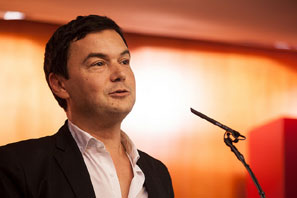
Thomas Piketty is in favor of small government, after all—but only when it doesn’t matter. Over New Year’s, the French economist and author of last year’s much-discussed Capital in the Twenty-First Century airily turned down his country’s highest award, the Legion of Honor. “I do not think it is the government’s role to decide who is honorable,” Piketty explained.
Almost everyone accepts government honors when they’re offered; Piketty’s refusal puts him in the company of Jean-Paul Sartre. You’d think Piketty would have been proud to stand in the company of this year’s 690 other honorees, including two British World War II veterans, an American painter, and a French nurse who survived Ebola. Apparently, Piketty thinks that his government isn’t smart enough to do two things at once. “They’d be better off concentrating on boosting growth in France and Europe,” he said.
Finally, a reason to check your email.
Sign up for our free newsletter today.
But if government can’t give out awards and nurture the economy at the same time, how can Piketty be confident that the government can competently carry out his complex policy prescriptions? In an update to his book, Piketty stands by his proposed fixes for the economy: “a progressive tax on labor income and a progressive tax on inherited wealth.” Of course, Western countries already have progressive taxes on wages. Piketty’s vision of a tax on inherited wealth is enormously complicated. What he calls a “simple rule of thumb” would involve “adapt[ing] the tax rates to the observed speed at which the different wealth groups are rising over time.” If the people on the Forbes list are getting richer, faster, the government should tax them at a higher rate—“as large as 5% per year, and possibly higher,” he suggests—to “stabilize the level of wealth concentration.” Piketty notes that figuring out how rich people really are would require “more financial transparency,” “better information about income and wealth dynamics,” and “better international fiscal coordination.”
That’s daunting enough, and it doesn’t come close to accounting for all the complexities that would arise. What if a wealthy individual has assets tied up in a company that doesn’t trade publicly and that would lose value if its owner sold it suddenly? Should it matter if a wealthy individual is already giving his money away to charity—and, if so, do the specific charities matter? Given his view of the government’s ability to bestow awards, it’s odd that Piketty has such confidence that it can figure out an ever-changing, optimal level of wealth taxation without causing more problems than it solves.
Piketty may have a more prosaic reason for rejecting the Legion of Honor: to disassociate himself from French president François Hollande’s flailing economic policies. Yet Hollande ran for office pushing a Piketty-like 75 percent income tax on the wealthy—a tax he has now abandoned because it didn’t bring in enough money, failed to end the country’s economic stagnation, and ran into legal difficulties. Hollande is now turning to less statist solutions, such as allowing shops to open their doors 12 Sundays per year instead of the current five. Whatever Piketty’s reasons, though, it’s striking that he can’t accept his government’s highest compliment—while he urges that same government to dig into people’s pockets more obtrusively than ever before.


